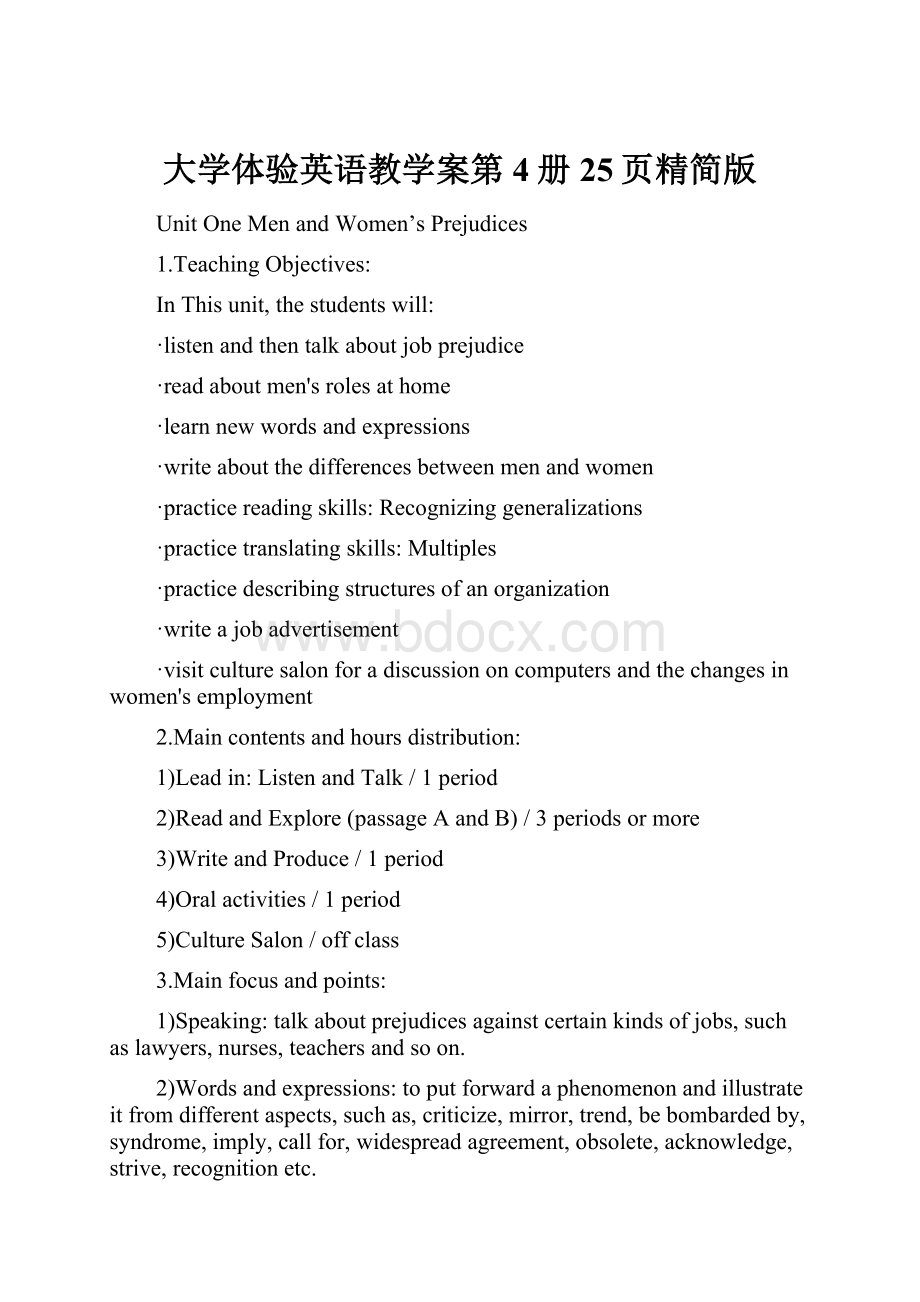大学体验英语教学案第4册25页精简版.docx
《大学体验英语教学案第4册25页精简版.docx》由会员分享,可在线阅读,更多相关《大学体验英语教学案第4册25页精简版.docx(28页珍藏版)》请在冰豆网上搜索。

大学体验英语教学案第4册25页精简版
UnitOneMenandWomen’sPrejudices
1.TeachingObjectives:
InThisunit,thestudentswill:
·listenandthentalkaboutjobprejudice
·readaboutmen'srolesathome
·learnnewwordsandexpressions
·writeaboutthedifferencesbetweenmenandwomen
·practicereadingskills:
Recognizinggeneralizations
·practicetranslatingskills:
Multiples
·practicedescribingstructuresofanorganization
·writeajobadvertisement
·visitculturesalonforadiscussiononcomputersandthechangesinwomen'semployment
2.Maincontentsandhoursdistribution:
1)Leadin:
ListenandTalk/1period
2)ReadandExplore(passageAandB)/3periodsormore
3)WriteandProduce/1period
4)Oralactivities/1period
5)CultureSalon/offclass
3.Mainfocusandpoints:
1)Speaking:
talkaboutprejudicesagainstcertainkindsofjobs,suchaslawyers,nurses,teachersandsoon.
2)Wordsandexpressions:
toputforwardaphenomenonandillustrateitfromdifferentaspects,suchas,criticize,mirror,trend,bebombardedby,syndrome,imply,callfor,widespreadagreement,obsolete,acknowledge,strive,recognitionetc.
3)Readingskills:
recognizinggeneralizations
4)Translatingskills:
Multiples
5)Writingskills:
descriptionofstructureandorganizationandwritingjobadvertisements
4.Extendedcontents:
PassageCandDinExtendedBook
5.Teachingmethods:
Multimediateachingtool.Student-centeredandtask-basedteachingmethods.
6.Referencebooks:
.CFLO/.englishXP
7.Exercisesandpractice:
Exercises3,4,5,6,7,9,and12,13,14,16.
8.Furtherthinking:
(Refertothecourseware)
9.Teachingprocedures:
Thefirsttwoperiods(90m)
1)(TSs)Leadin/discussion:
whatprejudicesdopeoplehaveaboutcertainkindsofjob?
Whatkindofwordswouldyouusetodescribethefollowingjobs,suchas,lawyer,nurse,teacher,architectandengineer?
(10m)
2)(TSs)Listeningtothepassageonpage9(10m)
3)(SsSs)Communicativetask1:
readdialogue1,learnsometipsandpracticeinpairs.(14m)
4)(SsSs)Communicativetask2:
readdialogue2,learnsometipsandpracticeinpairs.(11m)
5)PassageA:
Pre-readingtasks
1.(TSs)Whatdoesfathermeantoyou?
Useonesentencetodescribe.
2.(TSs),(SsSs)Shareyourideas:
Whatkindofmancouldbecalled“agoodfamilyman”?
Isyourfatheragoodfamilyman?
Doyouwanttobe/marryagoodfamilyman?
Why?
Whilereadingtasks
Questionsforthinking
Thefirstreading:
readingthroughtextAforreadingcomprehensioninexercise3.
Thesecondreading:
fillintheblankaboutthedetailedinformationoftextA.
Wordsandexpressions:
pickoutsomevaluablesentencesandwordsforstudentstoanalyzeandremember.Encouragethemtousetheseexpressionswhilewriting.
Readingreflection
vGeneralizingmainidea
Readthepassageandgeneralizeitsmainidea.
(It’smainlyaboutsomemediatrendstowarddiminishingtheimportanceoffathersintheU.S.)
vSumupthemediatrendstowardsfatherhood.
Marginalizingfathers;
abusivehusbands/deadbeatdads;
At-homedadsandworkingmothersarepraised.
At-homemothersandbreadwinnerfathersaredevalued.
At-homewivesareregardedas“statussymbols”,etc.
Findwordsorexpressionsinthetextwhichshowtheauthor’sattitudetowardsthemediatrendofmarginalizingfathers.
6.(TSs)Assignment:
writingacompositiononprejudicesagainstmen/womeninjob-hunting.
Thethirdperiod(45m)
1)(SsSs)Prepareasmanyquestionsaspossibleabouttherolesofthefatherinthefamilyandinterviewyourclassmateswiththehelpofthetipsgivenonpage17.
2)(SsSs)Ingroupsof4,interviewyourgroupmembersandwritedowntheiranswers.(15m)
3)(SsSs)Discussingroupsaboutyouranswersanddrawaconclusion.
4)(SSs)Reporttothewholeclassaboutyourgroup’sopinions.
Thefourthandfifthperiods(90m)
1)(SsSs)PassageB:
Discussthefollowingquestions:
wouldyouliketochangecareersorevengiveupjobsattherequestofyourspouse?
Whyorwhynot?
(5m)
2)(TSs)Readthroughthetextandinyourownwordsgeneralizeitsmainidea.
3)(TSs)Readthepassagemorecarefullyandtrytocompletethesummary.(Seecourseware)
4)(TSs)Wordsandexpressions:
analyzesomevaluablesentencesinpassageB.(15m)
5)(Ss)Exercises:
4,5,6,12,13,14.(30m)
6)(TSs)Readingskills:
recognizinggeneralizationsandexercise15.(15m)
7)(TSs)Generalwriting
Descriptionofstructureandorganization
First,readtheintroductiononp.26.
Studytheexpressionsonp.26.
WriteadescriptionofanorganizationinyourcollegeorattheUniversitysuchastheStudents’Union,ScienceAssociation,etc.Bepreparedtomakeanoralpresentationonyourwork.
Thesixthperiod(45m)
1)Role-play
•RoleA
•Youareayoungpersonwhohasdecidedtomarrysomeoneyoulovewhocomesfromanothercountry(e.g.,America).Todayyou'lltelloneofyourparentsofthisdecision,andaskforhis/herapproval.Belowaresomeofthereasonswhyyouthinkyourinternationalmarriagewillbesuccessful(thinkofotherreasonsbyyourself):
•Youfeelthatinsuchamarriage,youwill:
•developabroaderpoint-of-view
•enjoymorestraightforward,honestcommunication
•shareculturalbackgrounds
•haveachancetotravelorliveoverseas
•beabletoraisebilingualchildren
•Youwillspeakfirst.Say,"Mother(orFather),Ihavedecidedtomarryaman(orwoman)from(nameofcountry).Ihopethatyouwillgiveyourapproval."
•RoleB
•Youarethemotherorfatherofayoungpersonwhohasdecidedtomarrysomeonewhocomesfromanothercountry(e.g.,America).Todayyourchildwilltellyouofthisdecision,andaskforyourapproval.Belowaresomeofthereasonswhyyouthinkthisinternationalmarriagewillnotbesuccessful(thinkofotherreasonsbyyourself).Argueagainstthemarriage,butintheend,decideforyourselfwhetherornottogiveyourapproval.Belowaresomeofyourconcerns(thinkofothersbyyourself):
Youworrythatinsuchamarriage,yourchildwill
-quarreltoomuchoverdifferentwaysofthinking
-havealimitedrelationshipbecauseoflanguagebarrier
-havedifficultywithdifferentcustoms,foods,etc.
-riskbeingseparatedfromfamilyandrelatives
-raisechildrenwhoareconfusedabouttheirculturalidentity(whichculturetheybelongto)
Yourchildwillspeakfirst.Listen,thenthinkandrespondtowhatheorshesays.
2)Commentsandsuggestions
UnitTwoCulture
1.TeachingObjectives:
Inthisunit,thestudentswill
firstlisten,andthentalkaboutdifferentcultures
readinformationaboutaspectofculture
learnmorewordsandexpressions
practicereadingskills:
distinguishingfactfromopinions
practicetranslationskills:
numbers
learnhowtowriteaprogramforperformanceandapassagetointroducetheinternet
learntotalkabout“Isitnecessarytoprotecttraditionalculture?
”(e.g.onprotectingoldbuildings)
visitculturesalonforinformationaboutChinesedragonculture
2.MainContentsandHoursDistribution:
1)Introducethecourseandlisteningandspeakingpractice/1period
2)ReadandExplore(PassageAandB)/4periods
3)Exercises/1period
4)WriteandProduce/1period
5)CultureSalon/offclass
3.MainFocusandPoints:
1)Listening:
forspecificinformation
2)Speaking:
InvitingafriendtocelebratetheDragonBoatFestival
3)Reading:
Distinguishingfactfromopinion
4)Writing:
Formingcompoundandcomplexsentences
5)Languagepoints:
alter,compel,deceive,inflict,misrepresent,option,becapableof,betakenin,loudandclear,thanksto,withtheexceptionof
4.ExtendedContents:
PassagesCandDinExtendedBook
5.TeachingMethods:
Teacher’sinstructionandstudents’discussion
6.TeachingProcedures:
Thefirsttwoperiods(90m)
Task1:
(TSs)Lead-inquestions:
Herearetypicalsymbolsofsomemajorcultures.
Whatdoyouthinktheyrepresentrespectively?
Wouldyouprefertoliveinamonocultureormulti-racialsociety?
Why?
VisitCultureSalonabout“ChineseDragonCulture”.
Task2:
(SsSs)Sharingexperience
Thinkaboutthequestion:
Haveyoueverexperiencedanykindofcultureshock?
Tellyourstorytoyourclassmates.
Task3:
TalkAboutIt
ListentoDialogueSample2andtrytoanswerthefollowingquestions.
ØWhattimeshouldaguestarrive?
ØWhatgenerallydoestheguestfirstdowhenhe/shearrives?
ØIftheguestiscaughtinatrafficjam,whatshouldhe/shedo?
ØIftheguesthasacceptedaninvitationandcan’tmakeit,whatshouldhe/shedo?
ØNeedtheguestbringanygifts?
Task4:
(TSs)HowmuchdoyouknowaboutShakespeare?
DiscusstheshortparagraphonP34withyourneighborandpointouttheerrors.
ThenlookatthepicturesofShakespeare’slifeandmakecommentsbasedonthesepictures.
Task5:
(SsSs)Lead-inlistening(textbook)
SsaregoingtolistentoaninterestingshortplayaboutvisitingShakespeare’shouse.TrytoanswerthequestionsonP34andfillintheblanksintheparagraphonP34(listentotheplayforthreetimes)
PassageDAppreciatingCulturalDifferencesMakesGoodBusinessSense
Task1.SkimmingandScanning
1.It’sessentialtounderstandtheculturaldifferencesifyouwanttobeprovedmorereliableincommercialrelationships.
2.Japanese,LatinsandGermansareplayingvitalrolesininternationalbusinessandtrade.
3.Latinslikephysicaltouchingandsmallpersonaldistance,soareGermans.
4.LatinstendtobemuchmorecasualandinformalthanGermansandJapaneseinmanners.
5.IfyoustareatyourJapanesebusinessassociateatameeting,heismostlikelytoturnawayhiseyes.
6.Germansplacebothhandsabovethetablewhentheyarehavingdinners.
7.It’scon